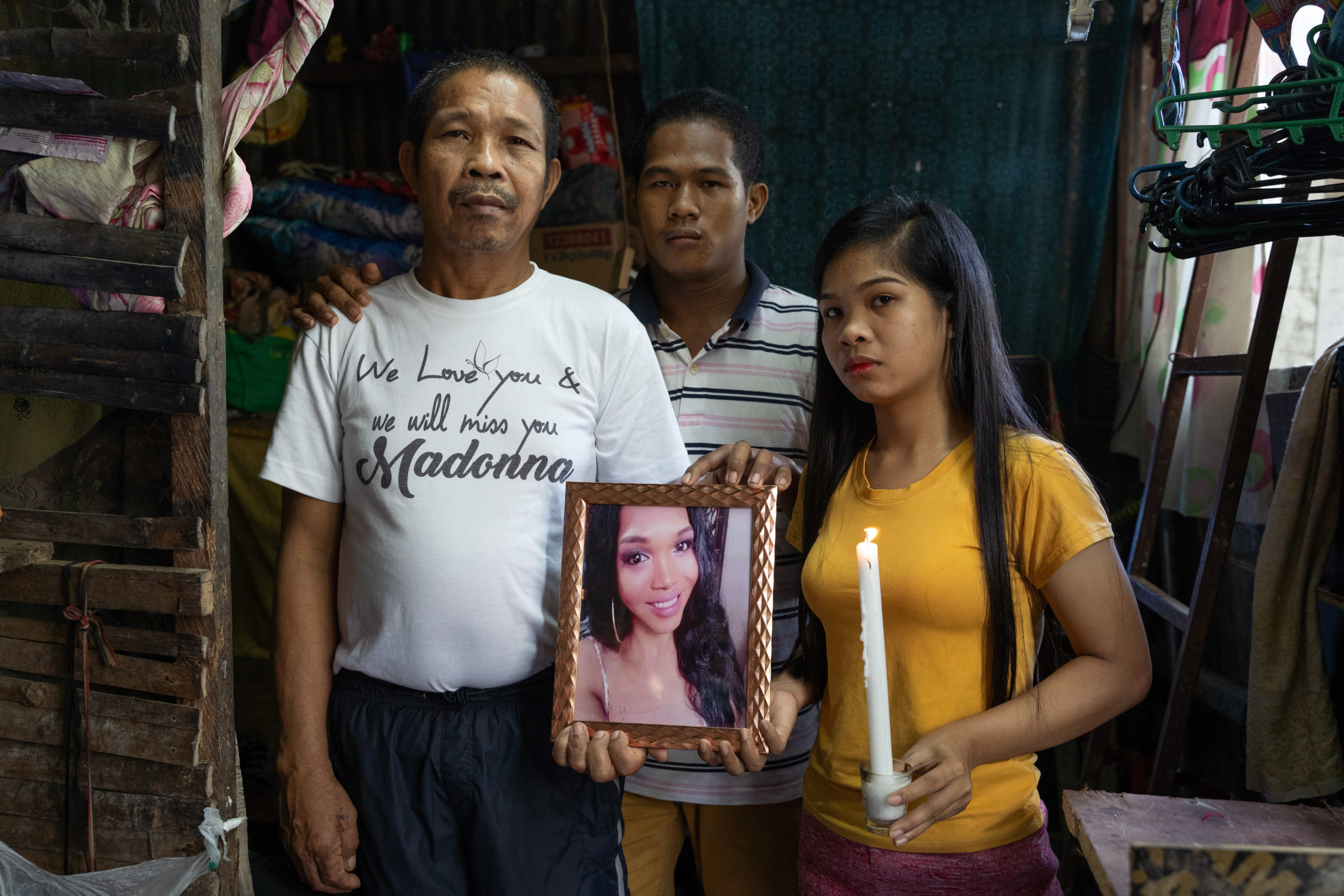Editor’s note: An edited version of this story appears in the January 2021 issue of Tatler Philippines.
The children found her first. Playing along the riverbanks in Caloocan City, to the north of Manila, they ran across piles of stones and discarded rubbish to where the woman floated in the muddy shallows. Her long black hair was a watery crown, her face tilted towards the sky. Later that afternoon, the police came and dragged her body onto dry land and marked it as evidence. Her name was Madonna—or Donna—Nierra, her sister announced through her tears. She was 23 years old, and she was found less than two miles away from home.
As Nierra’s family grieved their daughter, members of the Philippines’ LGBTQ community told me that they were feeling something in between terror and despair. Similar murders were happening every few months, they said, their voices wavering over the phone. Several women described an incident almost exactly one year earlier, on September 17, 2019, when Pangasinan residents called police to Patar beach on Luzon’s west coast, where 29-year-old Jessa Remiendo’s body lay in the white sand: her neck “almost completely cut through”. Almost every trans person I interviewed said they had feared for their life.
Over the past three years of reporting on gender-based violence in the Philippines, I’ve heard stories like Nierra’s and Remiendo’s again and again: tales that begin with a young woman on a night out, and end with a body in a river, on a beach, in a bathroom. Although both trans men and women experience abuse across the country, human rights groups told me it’s trans women who are particularly vulnerable to violence. Little data exists to illustrate the scale of the problem, but Nierra and Remiendo are two of at least 50 transgender or gender non-binary individuals who have been murdered across the archipelago since 2010, according to Transgender Europe’s Trans Murder Monitoring (TMM) initiative that tracks the murders of trans people around the world. The real death toll is likely much higher: When a trans woman is murdered, the Philippine National Police (PNP) logs her gender as male (and vice versa for trans men), while many LGBTQ activists say the stigma that continues to shadow homosexuality and queer identities often dissuades family members and friends from speaking out.
“We have so many [people] who tell us there was this trans woman who was found dead in some street, in some province, and there’s nobody who cares about her so that case doesn’t get reported,” said Naomi Fontanos, co-founder and executive director of GANDA Filipinas—a transgender rights organization based in Manila. “But certainly, we know that there’s violence directed against trans women in the Philippines. And it’s rooted in the same patriarchy that non-trans women experience in their daily life.”
Few protections for transgender people in the Philippines
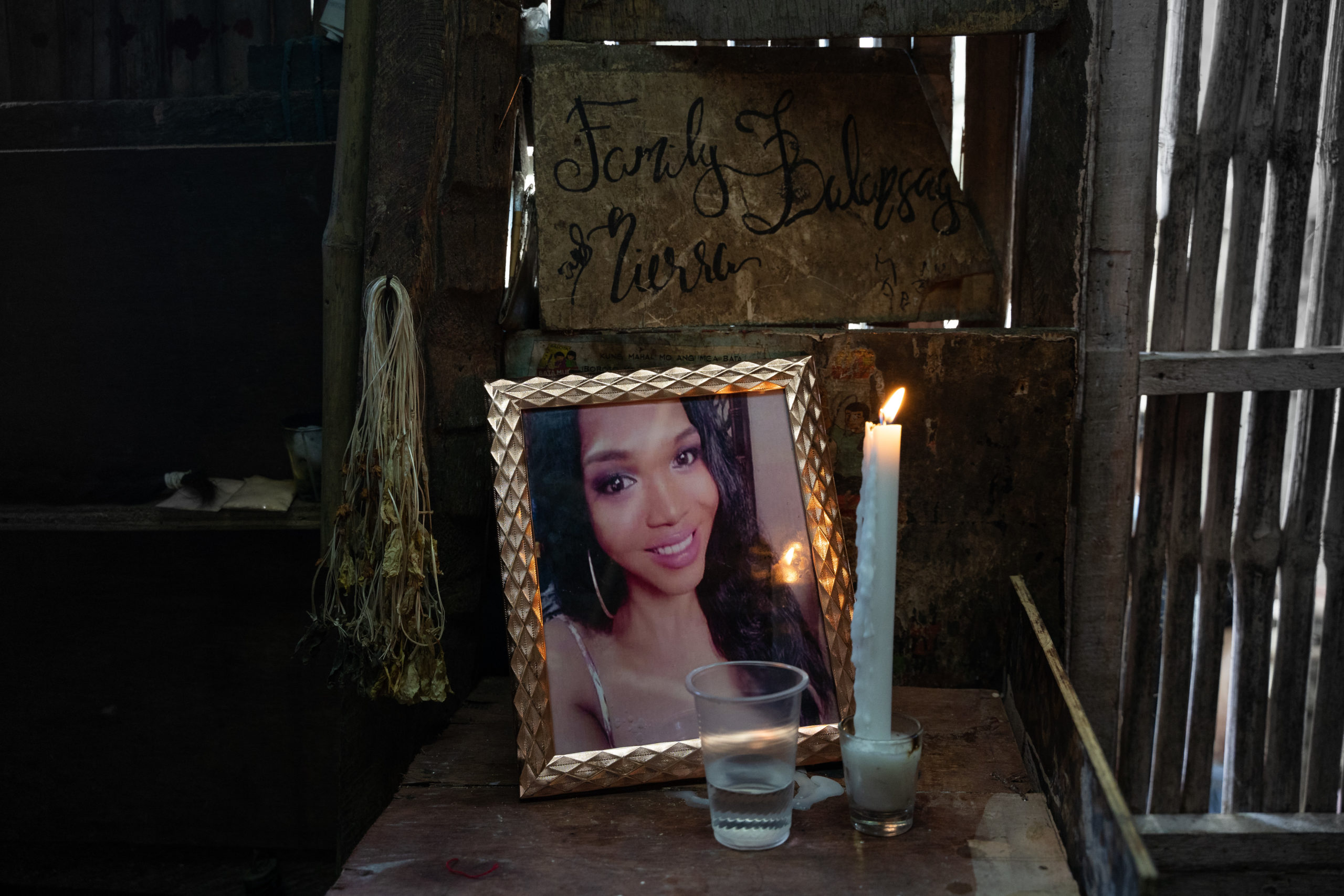
There are vanishingly few protections for trans women and men in the Philippines. A trans woman rarely has the legal right to complain if she is denied an interview on the basis of her sexuality or turned down for a position in a bank or a school (or a restaurant or a shop) because of her looks. If she does find a job, she has a 30 per cent chance of being bullied at work, according to a United Nations study in 2018. She can’t tick “female” when filling out a form or update her birth certificate, and she can’t marry a cisgender man. No data is collected on how likely she is to experience physical or sexual abuse, but she’s twice as likely to contemplate suicide, according to a 2014 report in the The Philippine Journal of Psychology, athough even death is unlikely to bring the discrimination to an end. Instead, “dead naming” will commence across social media and in the press, as strangers call her by the name and gender that others assigned her at birth, her true identity framed in inverted commas and undermined.
“Every time I hear terrible news about my trans sisters and trans brothers and trans siblings, it breaks me to pieces,” Amber Gonzales Quiban, 25, told me late last year. “They’re just trying to be the best person that they can be and, yet, because the world is so full of prejudice and hatred, they’re gone in a snap. Just like that, they’re gone.” Quiban has been campaigning tirelessly for transgender rights in the Philippines since 2012, most recently as policy and campaigns director for PANTAY Pilipinas. It’s work she considers her calling, even though it exposes her to further abuse online and often sees her lie awake through the night, scared both for her safety and that of her friends. When we call each other over Facebook messenger, it’s usually at around 11pm. On the other end of the phone, she sounds determined but worn down.
For those outside the Philippines, it can be hard to fully comprehend the everyday dangers experienced by trans women and men across its scattered islands, though they do occasionally make headlines around the world. Six years ago, a US Marine, Lance Corporal Joseph Scott Pemberton, killed 26-year-old Jennifer Laude in a hotel room in Olongapo City, a coastal municipality that was once home to a US naval base and remains the site of joint US-Philippine military exercises. Pemberton choked Laude until she passed out, then drowned her in a toilet in a brutal act of violence he later attempted to justify as self-defence. He hadn’t realised Laude was transgender, his lawyers said, at which the Laude family’s attorney raised her eyebrows. It seemed a particularly thin defense for murder, she shared with me at a later date.
‘Justice for Jennifer’
Members of the Philippines’ LGBTQ and women’s rights communities say that Laude’s death gave rise to an anger that first crackled like fire and soon started to spread. In crowds, they turned out to protest in front of the US Embassy and a courthouse in Olongapo, calling for ‘Justice for Jennifer” as they waved rainbow banners and burned an American flag. In December 2015, when a court found Pemberton guilty of homicide and sentenced him to six to ten years of imprisonment, they told me it felt like a small victory — although it was nothing compared to the pain of their trans sister losing her life.
But in September 2020, more than five years after Laude’s death, President Rodrigo Duterte announced that he had granted the marine an absolute pardon. One week later, Laude’s killer was deported to the US where he was discharged from the military with no further repercussions. In Manila, the protests started up once more, although this time they were socially distanced and sometimes held online. Over Zoom one evening, I joined two dozen women as they clutched tealights and raised their fists towards the ceiling. “#JusticeforJenniferLaude” one sign read. “#KeepPembertonInJail,” said another. In the corner of the screen, one woman wiped her eyes.
Related Coverage: He Killed a Transgender Woman in the Philippines. Why Was He Freed?
Were Pemberton not a US Marine, it’s unlikely Laude’s death would have earned the same attention. In January 2015, less than three months after Jennifer’s death and only 38 miles from where a crowd of TV reporters had filmed Julita Laude as she laid her daughter to rest in Olongapo Heritage Garden Cemetery, an unknown attacker repeatedly stabbed 17-year-old Jaja Canlas and ditched her body in the fields of an overgrown pig farm. According to one government report, Jaja was Pampanga’s reigning “Miss Teen Gay” at the time of her death. But although the case was referred to the Philippine Commission on Human Rights, her murder didn’t make the national news.
Trans people may face more danger following Duterte’s decision to pardon Pemberton. Despite a record of misogynist remarks, the President had previously spoken in support of same sex marriage and trans rights. But many believe Pemberton’s release sent a message of impunity and say that online, rates of abuse have already surged.
Reports suggest Duterte’s notorious and violent “war on drugs” is also directly responsible for the deaths of trans people—despite research that shows it’s often discrimination and transphobia that restrict opportunities and push some members of the marginalised community to sell drugs as a means of survival.
Too many ‘long forgotten cases’
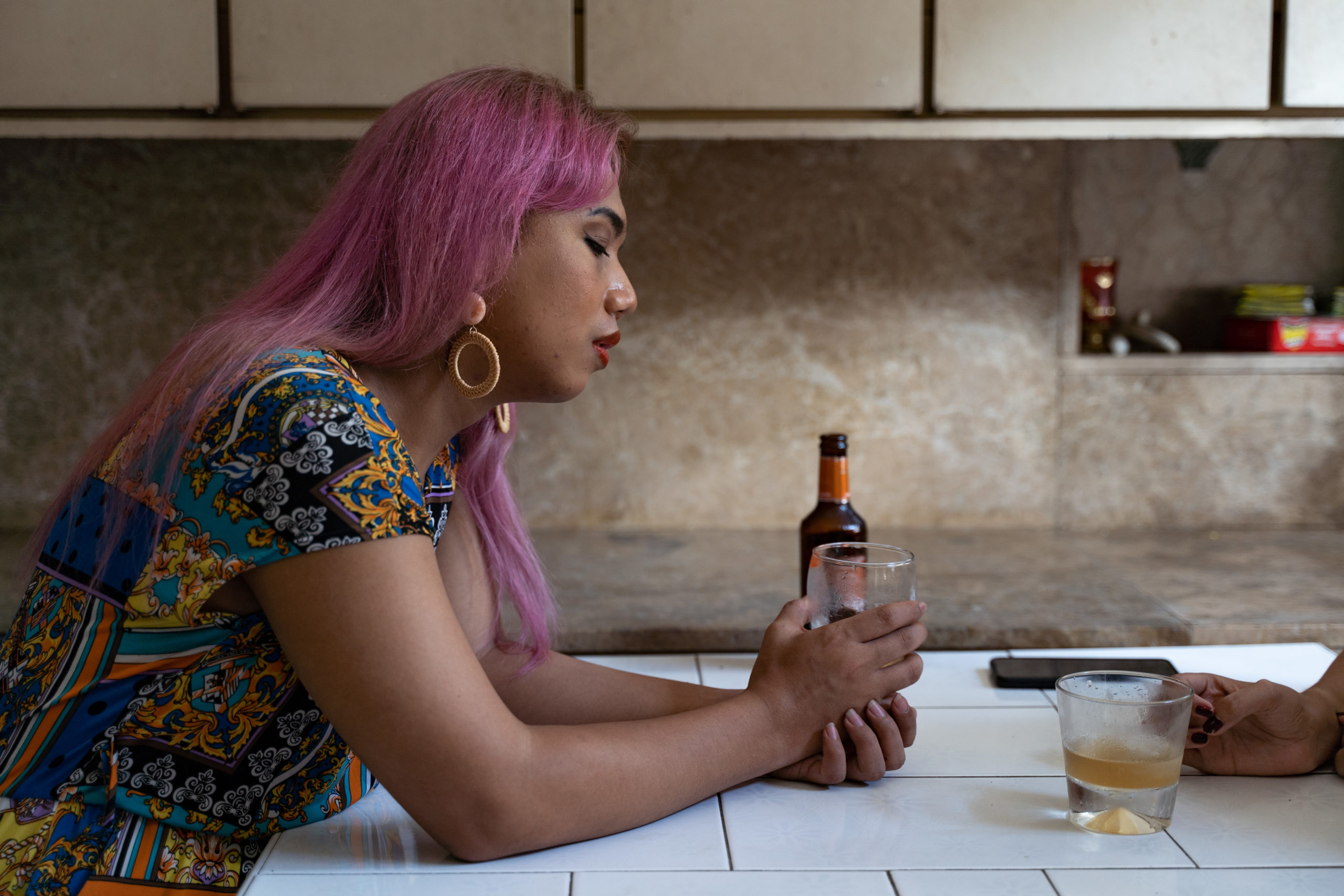
Whatever the circumstances of their murder, victims appear to have little chance of recourse: in the six years since Pemberton’s arrest, the Philippine National Police has publicly confirmed investigations into the murders of at least eight trans women, out of a reported 21. Some have proved successful: Jessa Remiendo’s two killers surrendered to police within five days of her death. But activists tell me others’ files are left unresolved: pale brown envelopes containing DNA tests and autopsy results piled up in corners, gathering dust.
There are far too many “long forgotten cases”, explained Pastor Michael Jason Masaganda of the Metropolitan Community Church of Marikina—an “affirming, accepting, inclusive” church for the LGBTQ community in Manila. In the weeks since Donna Nierra’s murder, he’s been working to contact Caloocan’s chief of police, Colonel Dario Menor, about the investigation. Without external pressure, Pastor Masaganda is worried the police will forget Nierra too. “It’s like they don’t bother,” he sighed, exhausted by years of fighting what he says often feels like the same fight, played out in different corners of the world. By the time Tatler went to press, the PNP had not responded to repeated requests for comment.
On Facebook, the extent of the violence is particularly painful to see. Frustrated by the apparent impunity of those who kill women in the Philippines, members of the Association of Transgender People in the Philippines have taken to sharing crime scene photos in a public group called Transgender Murder, Violence and Discrimination in the Philippines. The victims’ faces are mostly blurred, but the images are deeply upsetting: young women’s bodies in blood-soaked clothes, abandoned to die in the darkness. Condolences stack up underneath. “That poor girl,” wrote one of 430 commenters below a particularly graphic photo of 18-year-old Kitkat Mae Fermin, who was reportedly shot in the head in Davao City on October 2, 2016. “I’m scared every damn day,” another comment reads.
Following years of criticism around their perceived inaction, in 2018 the PNP began rolling out “LGBT desks” across its district offices, staffed by specially-trained officers to provide targeted support to those experiencing violence and abuse. But transgender rights advocates told me they think recent events have highlighted the PNP’s continued failure to safeguard one of the Philippines’ most vulnerable demographics. On April 7, one barangay captain in Pampanga forced a group of three LGBTQ people to kiss each other and perform degrading dance moves after barangay volunteers caught them breaking the 8pm curfew imposed to slow the spread of coronavirus. On June 26, police arrested 20 participants attending an LGBTQ Pride march in Manila and, according to arrestee Rey Valmores-Salinas of the local LGBTQ rights group Bahaghari National, unlawfully detained them until the end of the month.
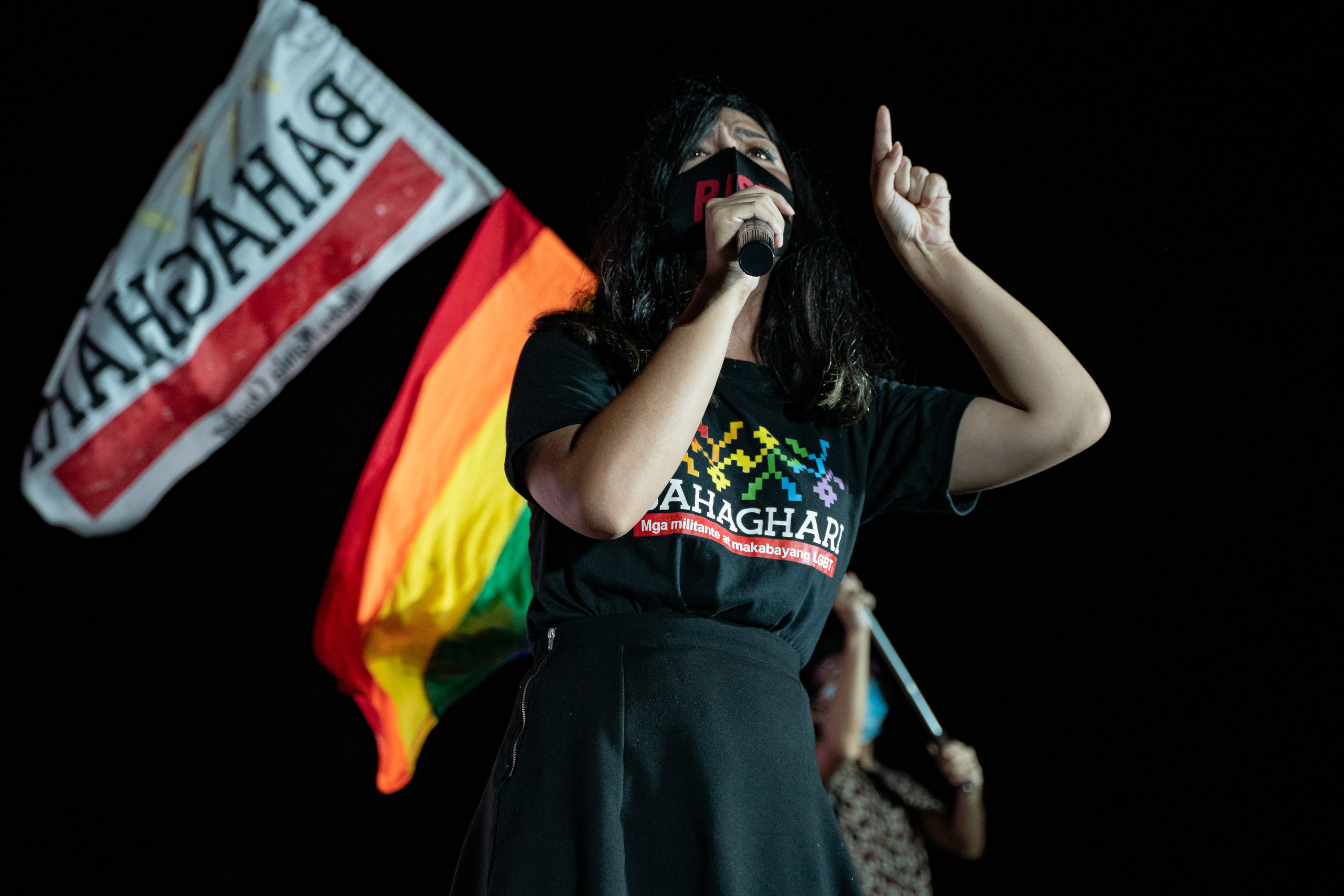
In the absence of a national law to protect LGBTQ people in the Philippines, more than 30 municipal and provincial governments have taken it upon themselves to implement local legislation against homophobic or transphobic abuse in their own communities. In June 2019, Pastor Masaganda led a successful campaign to convince Marikina City officials to introduce an anti-discrimination ordinance landing those who break the rules with fines of between 1,000 and 5,000 pesos and/or at least 60 days in jail. In October 2020, both the cities of Manila and Zamboanga followed suit, and passed their own anti-discrimination legislation. But the municipal laws cover less than 25 per cent of the Philippines’ population, meaning that approximately 80 million Filipinos are still unprotected from discrimination on the basis of who they fall in love with, the names they choose for themselves and the clothes they want to wear.
In her house in Bataan, Congresswoman Geraldine Roman frowned into the webcam. The first openly trans politician in the Philippines since 2016, she continues to face frequent discrimination from some fellow representatives who insist on calling her by male pronouns in public. “As a member of our government I still have to believe and try to see justice within our system, with its own limitations and its own defects,” she said. “That’s why I keep telling everyone, ‘just be careful’—knowing there are bigots on the loose out there who are willing to kill members of the LGBT community.”
On September 19, 2016, four months after her election, Roman took the floor in the House of Representatives in Quezon City and made an emotional plea to her peers to pass a piece of legislation that would protect LGBTQ individuals from discrimination. Under the proposed Sexual Orientation and Gender Identity and Expression (SOGIE) Bill, those who broke the law would face fines between 100,000 and 500,000 pesos. “Recognising our rights and dignity will in no way diminish yours,” Roman spoke to Congress, her eyes shining. “We are not asking for special privileges or extra rights. We simply ask for equality.”
Although Roman received a standing ovation after her speech, and the House went on to unanimously vote in the SOGIE Bill’s favour, the law stalled as soon as it reached the more conservative Senate. By the time the 17th Congress adjourned in June 2019, it was still on hold.
Roman told me that although she was dismayed at the blocking of the bill, she remains undeterred. Less than two months after the 17th Congress adjourned, Senators Risa Hontiveros, Imee Marcos and Francis ‘Kiko’ Pangilinan had all filed new versions of the bill to the 18th Congress, backed by international human rights organisations and LGBTQ advocacy groups. “So many people have used personal opinions and beliefs to justify abuse, discrimination and even murder,” wrote Hontiveros in an email in October. “The right to health, to education, to livelihood, should never be selective.” Despite widespread opposition from influential Catholic organizations and high profile senators including Senate President Tito Sotto and former boxing legend Manny Pacquiao, both Hontiveros and Roman are hopeful that this will be the year they succeed.
“To those doomsday prophets who say, ‘oh my God, recognising LGBT rights will mean the downfall of society and the heavens will fall and God will get angry and there’ll be Sodom and Gomorrah,’ well, you know, the sun still shines and continues to rise in Europe and the sky still hasn’t fallen in Europe and the United States,” Roman said. “We won’t lose anything by gaining rights and we have everything to gain.”
‘It reminds me so much of the fight for women’s rights’
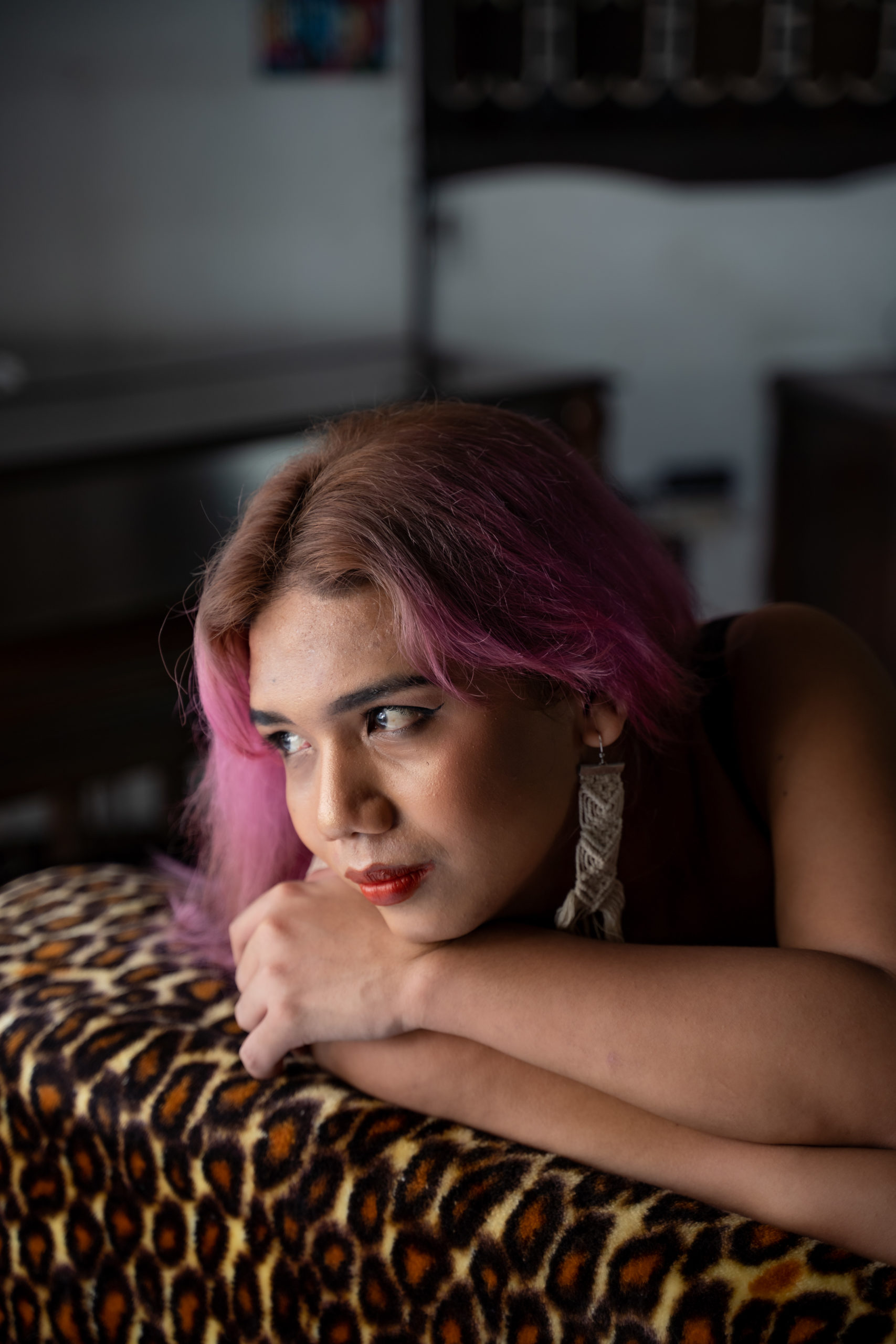
“It reminds me so much of the fight for women’s rights. Once upon a time, we weren’t allowed to vote, to work, or access to power,” added Hontiveros. “So it is the same for LGBTQIA+ rights: That we can give them the most basic respect and dignity already inherent to each and every one of us.”
Sometimes it does feel like the Philippines is inching towards equality, said Amber Gonzales Quiban. She recently found a job where her colleagues respect her, and she has received multiple promotions since the start of the pandemic. Everything seems to be going well. But then a group of children playing along a riverbank find a 23-year-old floating in muddy waters, and fear takes hold once more: To be born transgender is too often all it takes to cost a Filipina woman her life.
“These people, like me, have so many dreams,” said Quiban. “And that’s lost, just because people don’t seem to understand us and don’t seem to care about us at all.”
Names to remember
At least 50 trans people have been killed in the Philippines since 2010. Many were unidentified. These are those whose names we know:
- R. Soriaga
- D. Quintela
- R. F. Jr.
- Alyas
- J. A. Lanogan
- N. Barilla
- Jelwin Tolentino
- Lalie Cabrera
- C. Canlas
- Jenny
- Nieves Toledo
- Luningning Alsade
- H. Lidoma
- M. V.
- S. Bernal
- Nathalia Anne Gonzales
- J. Ganito
- Cielo Mercado
- Jennifer Laude
- Mary Joy Anonuevo
- Glydel Libranda
- Jaja Canlas
- Simeona Eva
- Ali Macky Ramos
- Jordan Borabien
- Andong Apolinario
- Joice Florano
- Barbie Ann Reilly
- Kitkat Mae Fermin
- Mayla Gonzales
- Heart De Chavez
- J. R. P. Mangalili
- Charlotte Oquias Lapasaran Logronio
- Jheayn
- J. R. P. Mangalili
- Shanaia
- Rica Reyes
- Heart Pontanes
- Jessa Remiendo
- Donna Nierra


 Corinne Redfern
Corinne Redfern